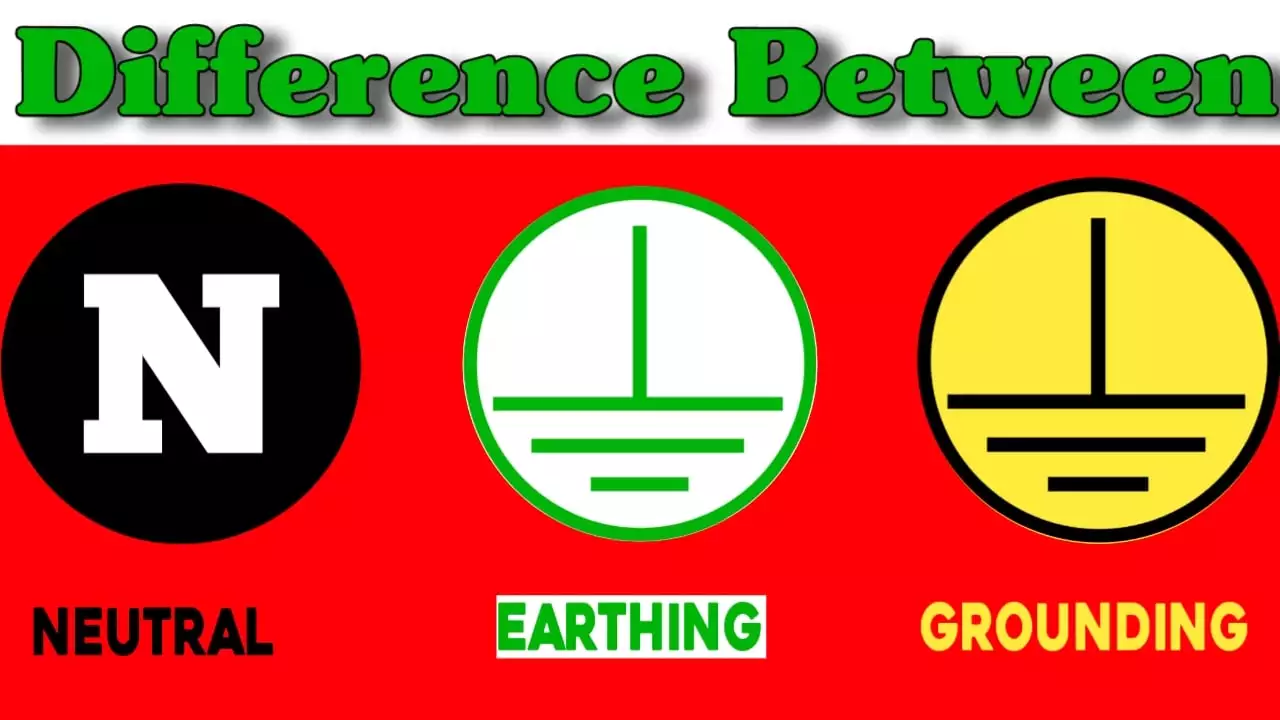Fun Tips About Can I Use Ground Instead Of Neutral

How To Do Grounding Or Earthing At Mary Lockridge Blog
Ground vs. Neutral
1. Understanding the Basics
Okay, let's talk electricity. It's not exactly the most thrilling topic, but understanding the difference between ground and neutral wires is crucial for electrical safety. Think of it like this: neutral is the designated return path for electrical current, the road current takes to go back to the source after powering your blender or your smart fridge. Ground, on the other hand, is your safety net, designed to provide an alternative path for electricity to flow in the event of a fault — a short circuit, a loose wire, the gremlins of electrical malfunctions causing chaos behind your walls.
Imagine your appliances are race cars zooming around a track. The neutral wire is the regular racetrack, the planned route. The ground wire is the sand trap next to the track. The cars shouldn't need the sand trap. But if something goes wrong, like a blown tire (a short circuit!), the sand trap is there to stop them from crashing into the stands (electrocution!). Its all about creating a safe system to protect both your devices and, much more importantly, you.
Therefore, attempting to use the ground wire as a neutral wire is generally a bad idea. The grounding system is usually connected to earth and is intended to only carry current during fault conditions. Regular current on the ground wire can cause a multitude of problems. It's not designed for constant use.
Think of it like asking your spare tire to be your primary tire all the time. Sure, it might work for a little while, but it's not built for that, and eventually, you're going to have a very bad day on the side of the road. Similarly, using ground as neutral will likely result in hazardous conditions and potential equipment damage.

Sherwin Williams Neutral Ground SW 7568 Paint Color
Can I Use Ground Instead of Neutral? The Short Answer
2. Why It's a Bad Idea (And Potentially Deadly)
Seriously, resist the urge! Using ground instead of neutral is like trying to use a fire extinguisher to water your plants. Both involve squirting something, but one is clearly not suited for the other. The neutral wire is part of the normal circuit, designed to carry current. The ground wire is for emergencies only. Its purpose is to provide a low-resistance path back to the source in case of a fault, allowing the circuit breaker to trip and cut off the power before you get zapped.
Imagine you rewire your kitchen and decide to use the ground wire as the neutral for your microwave. What happens when there's a surge or a short? Instead of safely tripping the breaker, the current could flow through the ground wire, potentially energizing anything connected to the grounding system — metal pipes, appliance casings, even the screws on your light switches. You could turn your whole house into a giant, slightly terrifying, electrical hazard.
Furthermore, electrical codes strictly prohibit using ground as neutral for all the reasons above. Ignoring these codes isn't just a matter of being a rebel without a cause; it's putting yourself and others at serious risk. It also could void your insurance in the event of a electrical accident.
Think of your house as a well-oiled machine, and the electrical wiring is like the veins and arteries. If you start rerouting the blood flow in a way it wasn't designed for, things are going to go wrong, quickly and spectacularly. And probably involve a visit from some very concerned firefighters.

Potential Problems When Using Ground as Neutral
3. From Annoyances to Catastrophes
Using the ground wire as a neutral conductor can lead to a whole host of problems, ranging from minor annoyances to major catastrophes. Let's start with the annoying stuff. You might experience flickering lights, humming sounds from appliances, or unexplained electrical glitches. These are all signs that something is amiss in your electrical system and shouldn't be ignored.
More seriously, using the ground wire as neutral could cause equipment damage. Sensitive electronic devices like computers, TVs, and stereos are particularly susceptible to damage from voltage fluctuations and stray currents. These can shorten their lifespan or even render them completely useless. Imagine frying your brand new OLED TV because you thought you could save a few bucks by using the wrong wire — not a great scenario.
But the most significant risk, of course, is electrical shock. If the grounding system becomes energized due to a fault, anyone who comes into contact with a grounded metal object could receive a potentially lethal shock. This is especially dangerous in wet areas like bathrooms and kitchens, where the risk of electrocution is much higher. It's not worth the risk to try and use ground as neutral.
There could even be an increased risk of fire. When current flows through the ground wire due to it being misused as a neutral wire, it will cause the wire to overheat and could ignite surrounding materials and lead to an electrical fire. Electrical fires can spread quickly and be incredibly difficult to extinguish, posing a serious threat to your home and your life.

Difference Between Neutral, Earthing And Grounding Neutral Vs Ground
What To Do Instead
4. Safe and Sound Electrical Practices
So, if you can't use ground as neutral (and you definitely shouldn't), what should you do? The answer is simple: wire things correctly! Always use the appropriate wires for their intended purpose. Ensure that your neutral wires are properly connected and that your grounding system is intact and functioning correctly. If you are unsure about any aspect of your electrical wiring, consult a qualified electrician.
Before undertaking any electrical work, always turn off the power at the circuit breaker. This is the most important safety precaution you can take. It's like wearing a seatbelt while driving; it's a simple step that can save your life. Use a voltage tester to verify that the power is off before touching any wires. This will give you an extra layer of protection against accidental shocks.
If you're adding new outlets or fixtures, make sure they are properly grounded. This typically involves connecting the grounding wire to the grounding screw on the outlet or fixture. If your home has older wiring without a grounding conductor, you may need to consult an electrician about upgrading your electrical system. There are ways to make this safer.
And remember, when in doubt, call a professional. Electricity is not something to be taken lightly. A qualified electrician has the knowledge, skills, and experience to handle electrical work safely and correctly. Paying for professional electrical work may seem like an expense, but it's an investment in your safety and the safety of your home.

FAQ
5. Clearing Up Common Confusions
Let's address some common questions people have about ground and neutral wires.
6. Question 1
Answer: Neutral wires are typically white or gray, while ground wires are usually green or bare copper. However, it's always a good idea to double-check with a voltage tester to be absolutely sure before touching any wires. Color coding isn't always reliable, especially in older homes where wiring may have been done incorrectly.
7. Question 2
Answer: Swapping the neutral and ground wires can create a dangerous situation. It can cause appliances to become energized, potentially leading to electric shock or equipment damage. It can also cause circuit breakers to trip unnecessarily. If you suspect you've accidentally switched the wires, immediately turn off the power and call a qualified electrician.
8. Question 3
Answer: If your home lacks grounded outlets, you have a few options. One is to install GFCI (Ground Fault Circuit Interrupter) outlets. These outlets provide protection against electric shock by detecting ground faults and quickly cutting off the power. Another option is to have an electrician run a new grounding wire to each outlet. Consult with an electrician to determine the best solution for your specific situation. They will also be able to verify that there is no other electrical faults in the system.
9. Question 4
Answer: Absolutely not! Cheater plugs, also known as three-prong to two-prong adapters, are designed to bypass the grounding connection. Using a cheater plug eliminates the safety provided by the grounding system and significantly increases the risk of electric shock. Never use a cheater plug — it's a shortcut that could have deadly consequences.

Wrapping It Up
10. A Final Word of Caution
So, there you have it. Using ground instead of neutral is a recipe for disaster. It's not worth the risk to save a few bucks or take a shortcut. Electricity is a powerful force, and it should be treated with respect. Always follow proper wiring procedures, and when in doubt, call a qualified electrician. Your safety and the safety of your home depend on it.
Think of electrical safety like following the recipe when you're baking a cake. Sure, you could substitute ingredients or skip steps, but the end result might be a culinary catastrophe. Similarly, when it comes to electricity, following the rules is essential for a safe and successful outcome. So, stick to the recipe, and don't try to use ground as neutral!
Remember, electrical work is not a DIY project for the faint of heart. It requires specialized knowledge, skills, and equipment. If you're not comfortable working with electricity, leave it to the professionals. Your health and well-being are far more valuable than saving a few dollars on electrical repairs.
Stay safe, stay grounded (properly!), and keep those circuits flowing smoothly. And if you ever find yourself staring at a tangle of wires, wondering what to do, remember the golden rule: when in doubt, call an electrician!